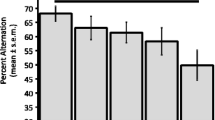Abstract
The neurochemistry of memory remains to be determined. Acetylcholine may be one of the neuotransmitters which mediates memory function, since the anticholinergic drug scopolamine produces amnesia in man. This study of scopolamine-induced memory deficits further defines those cognitive processes which are disrupted. The drug does not diminish attention, as assessed with an auditory vigilance task, or initial signal detection. More complex auditory decoding is affected, however. Scopolamine impairs aspects of initial memory acquisition (e. g., encoding and consolidation) and spontaneous memory retrieval. Retention is unaffected. Precise delineation of the neurochemistry of human memory will require comparative studies of amnesia-producing compounds, systematically examining the neuropsychological processes impaired by each.
Similar content being viewed by others
References
American National Standards Institute (1969) Specifications for audiometers (ANSI 3.6-1969). New York
Battig WF, Montague WE (1969) Category norms for verbal items in 56 categories. J Exp Psychol Monogr 80:1–46
Brazier MAB (1979) Brain mechanisms in memory and learning. Raven, New York
Buschke H (1973) Selective reminding for analysis of memory and learning. J Verb Learn Verb Behav 12:543–550
Caine ED (1979) Anticholinergic toxicity. N Engl J Med 300:1278
Caine ED, Ebert MH, Weingartner H (1977) An outline for the analysis of dementia: The memory disorder of Huntington's disease. Neurology (Minneap) 27:1087–1092
Crow TJ, Grove-White IG (1973) An analysis of the learning deficit following hyoscine administration to man. Br J Pharmacol 49:322–327
Cudahy E (1977) Gap detection in normal and hearing-impaired listeners. Paper presented at the annual meeting of the American Speech and Hearing Association, Chicago, Illinois, 1977
Drachman DA (1977) Memory and cognitive function in man: Does the cholinergic system have a specific role? Neurology (Minneap) 27:783–790
Drachman DA, Leavitt J (1974) Human memory and the cholinergic system. Arch Neurol 30:115–121
Frumin MJ, Herekar VR, Jarvik ME (1976) Amnesic actions of diazepam and scopolamine in man. Anesthesiology 45:406–412
Ghoneim MM, Mewaldt SP (1975) Effects of diazepam and scopolamine on storage, retrieval and organizational processes in memory. Psychopharmacologia 44:257–262
Ghoneim MM, Mewaldt SP (1977) Studies on human memory: The interactions of diazepam, scopolamine, and physostigmine. Psychopharmcology 52:1–6
Hardy TK, Wakely D (1962) The amnesic properties of hyoscine and atropine in preanes thetic medication. Anesthesia 17:331–336
Hirsh IJ (1959) Auditory perception of temporal order. J Acoust Soc Am 31:759–767
Ludlow CL, Caine ED, Cudahy E, Nutt J (1979) Impaired auditory processing in Huntington's disease. Paper presented at the annual meeting of the International Neuropsychological Society, New York 1979
Paivio A, Yuille JC, Madigan S (1968) Concreteness, imagery and meaningfulness values for 925 nouns. J Exp Psychol Monog 76:1–25
Peterson RC (1977) Scopolamine-induced learning failures in man. Psychopharmacology 52:283–289
Safer DJ, Allen RP (1971) The central effects of scopolamine in man. Biol Psychiatry 3:347–355
Sitaram N, Weingartner H, Gillen JC (1978) Human serial learning: Enhancement with arecholine and choline and impairment with scopolamine. Science 201:274–276
Swisher L, Hirsh IJ (1972) Brain damage and the ordering of two temporally successive stimuli. Neuropsychology 10:137–152
Thorndike EL, Lorge I (1944) The teacher's word book of 30,000 words. New York: Columbia University Teacher's College, Bureau of Publications
Weingartner H, Caine ED, Ebert MH (1979a) Imagery, encoding and the retrieval information from memory: Some specific encoding-retrieval changes in Huntington's disease. J Abnorm Psychol 88:52–58
Weingartner H, Caine ED, Ebert MH (1979b) Encoding processes, learning and recall in Huntington's disease. Adv Neurol 23:215–226
Wightman F, McAdams SE (1978) Pitch of complex tones for hearing-impaired listeners. J Acoust Soc Am 64:539
Author information
Authors and Affiliations
Rights and permissions
About this article
Cite this article
Caine, E.D., Weingartner, H., Ludlow, C.L. et al. Qualitative analysis of scopolamine-induced amnesia. Psychopharmacology 74, 74–80 (1981). https://doi.org/10.1007/BF00431761
Received:
Accepted:
Issue Date:
DOI: https://doi.org/10.1007/BF00431761




